Last week, with information suggesting attacks were imminent, Australian police mounted the largest counterterrorism raids in that country’s history. The raids came after ISIS commander Mohammad Ali Baryalei instructed his followers in Australia to execute specific attacks which local police believed would have resulted in mass casualty events and beheadings.
800 officers in multiple cities fanned out and arrested 15 terror suspects, resulting in mass protests from Australia’s Muslim community. The raids did not, however, preempt violence. In a scenario out of a law enforcement officer’s nightmare, on Australian officer was forced to shoot and kill an 18-year-old when the teen attacked two police officers with a knife.
One of the officers, from the Australian Federal Police (AFP), was in a serious but stable condition in hospital with “knife wounds to his neck, stomach and head,” Lay said. The other, a Victorian police officer, suffered a serious slash wound to his arm.
Australia to deploy force against ISIS Australia raises terror threat rating Acting Prime Minister Warren Truss told parliament the seriously injured AFP officer, a 43-year-old father of two, was a joint counter-terrorism officer who had been with the AFP since June 2012.
Australian politicians revealed the deceased suspect was Abdul Numan Haider, a person of interest for law enforcement who had posted images of ISIS propaganda on his Facebook page and was reportedly shopping for the black flag commonly deployed by Islamic State fighters.
Australia is not the only home front engaged in a war to head off attacks from homegrown fundamentalist Islamic militants. Overnight, nine people were arrested in massive counterterrorism raids in the United Kingdom, including one of the country’s most prominent Islamist clerics, Anjem Choudary.
The Telegraph reported overnight that the nine who were arrested were suspected of being members of Choudary’s organization, Al-Muhajiroun, which was banned in the U.K. in 2010.
Mr Choudary also said he had been “closely associated” with [convicted terrorist Abu Hamza al-Masri] since the early 1990s.
Earlier this week, it was reported that Mr Choudary said he has no sympathy for Alan Henning, a volunteer aid worker captured in Syria whose life was threatened in a recent video released by IS.
Mr Choudary is reported to have said: “In the Koran it is not allowed for you to feel sorry for non-Muslims. I don’t feel sorry for him.”
Australia is involved in support for the coalition mission aimed at rolling back ISIS in Iraq and degrading it in Syria, and the government is currently considering a tougher counterterrorism law. The United Kingdom is expected to soon pass a resolution which will commit British forces to engaging in airstrikes on ISIS targets in Iraq.
America’s tradition of assimilating immigrants has reduced the threat from with homegrown Islamic radicalism, but not entirely mitigated it. “Assuming ISIS does turn its gaze more to the U.S., and tries to train and deploy anti-American terrorists, as Obama fears, its recruiting will likely be helped by America’s new war on it,” The Atlantic’s Robert Wright fretted last week.
Wright noted that the Fort Hood shooting and the Boston Marathon bombings were attacks inspired by radical Islam and were committed by individuals who were, by all accounts, naturalized Americans. The FBI has already posted warnings to local police advising them to be on the lookout for lone wolf actors with only tenuous links to foreign handlers who may be planning to execute small-scale attacks – plots which would be difficult to detect in advance.
If the United States ever experienced what Australia is involved with now, a world in which police must fear that radicalized youth will charge at them from the shadows with the intent to kill, American society would likely change for the worse in short order. The president’s approach to neutralizing this threat, to demand that moderate Muslims in the U.S. and around the world more vocally condemn the actions of Islamic radical terror networks, is a good start. But will it be enough to entirely prevent homegrown terror attacks inside the United States?








Join the conversation as a VIP Member